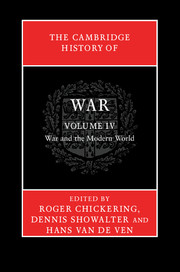Book contents
- Frontmatter
- Contents
- Illustrations
- Maps
- Notes on contributors
- Introduction to volume IV
- Part I The industrialization of warfare, 1850–1914
- 1 A hinge in time
- 2 War, technology, and industrial change, 1850–1914
- 3 War and imperial expansion
- 4 The non-western world responds to imperialism, 1850–1914
- 5 War, society, and culture, 1850–1914
- 6 War-making and restraint by law
- 7 The arms race
- Part II The Era of Total War, 1914–1945
- Part III Post-total warfare, 1945–2005
- Select bibliography
- Index
- References
1 - A hinge in time
the wars of the mid nineteenth century
from Part I - The industrialization of warfare, 1850–1914
Published online by Cambridge University Press: 05 December 2012
- Frontmatter
- Contents
- Illustrations
- Maps
- Notes on contributors
- Introduction to volume IV
- Part I The industrialization of warfare, 1850–1914
- 1 A hinge in time
- 2 War, technology, and industrial change, 1850–1914
- 3 War and imperial expansion
- 4 The non-western world responds to imperialism, 1850–1914
- 5 War, society, and culture, 1850–1914
- 6 War-making and restraint by law
- 7 The arms race
- Part II The Era of Total War, 1914–1945
- Part III Post-total warfare, 1945–2005
- Select bibliography
- Index
- References
Summary
A series of military cataclysms rocked the world in the middle decades of the nineteenth century. The Taiping Rebellion of 1850–64 in China was the most devastating, laying waste to provinces along the middle and lower stretches of the Yangzi River and causing some 20–30 million deaths. During the 1861–65 American Civil War, some five hundred thousand men lost their lives and a similar number died from wounds and diseases. The 1853–56 Crimean War led to the deaths of more than a hundred thousand British and French soldiers and a far higher number of Russian ones. The casualty figures of the Indian Rebellion of 1857–58 were small by comparison, but they nonetheless had important consequences, as London took direct control of India, racialist prejudices became entrenched, and empire became a subject of intense and broad public concern. In Europe’s core, wars were few and short but also deadly. The Franco-Prussian War of 1870–71 caused 150,000 to 200,000 deaths.
These conflicts were not part of a world war, nor did they arise from a general world crisis. There were connections between them nonetheless, including in personnel. General Charles Gordon saw action in the Crimea and led a British expedition to China, before finally being killed in Khartoum in 1885. General George McClellan, who briefly served as the Union’s commander-in-chief during the American Civil War, observed the Crimean War in person, drawing lessons from it that later informed the North’s initial approach to the war. The wars impacted on each other. The Crimean War and the Indian Rebellion left the British short of troops in China. Chinese officials interpreted the temporary inability of the British to back up their demands and threats with force as a sign of persistent weakness. The Crimean War also stoked British fears of Russian expansionism in East Asia.
- Type
- Chapter
- Information
- The Cambridge History of War , pp. 16 - 44Publisher: Cambridge University PressPrint publication year: 2012



